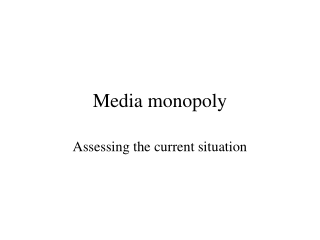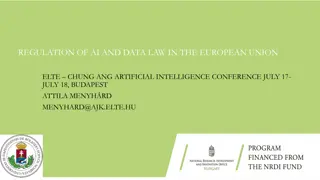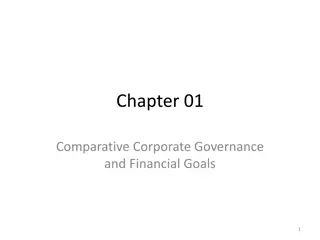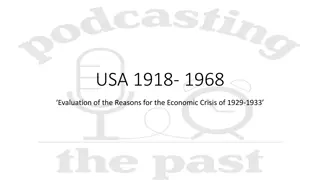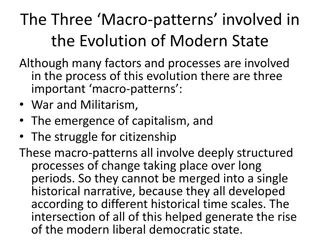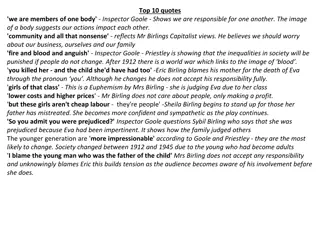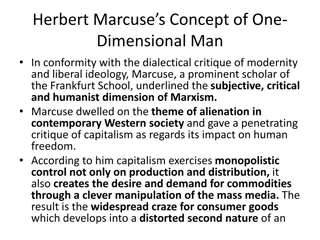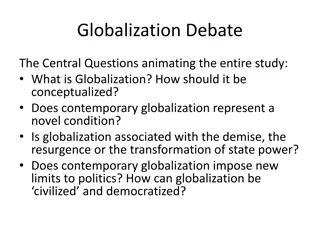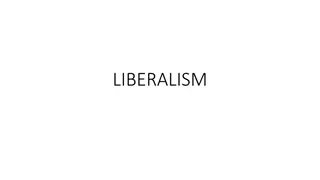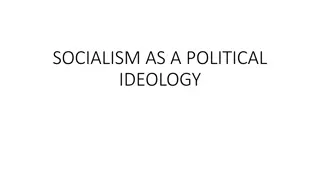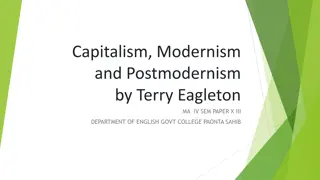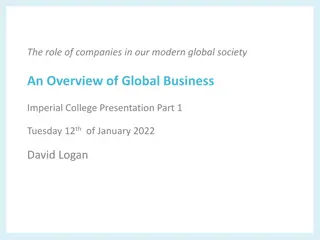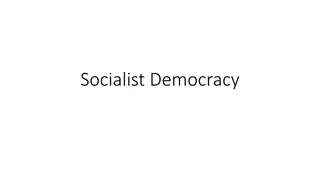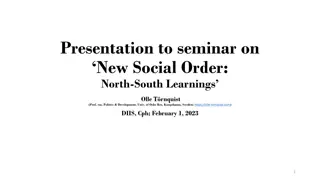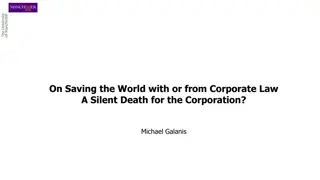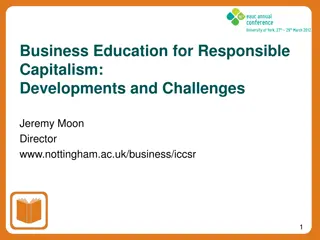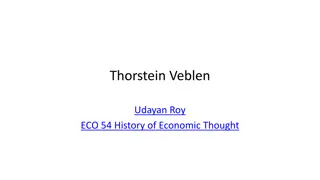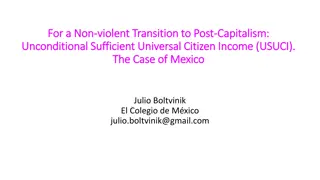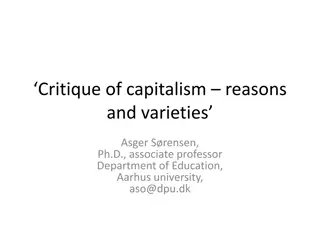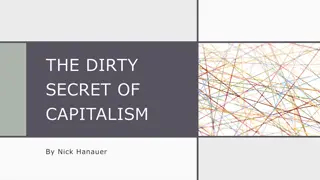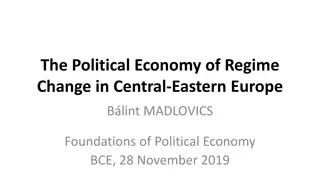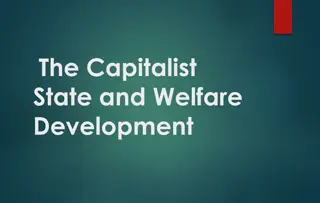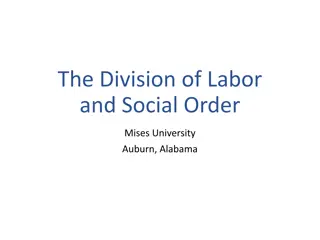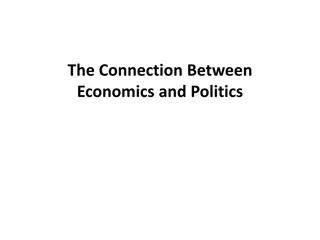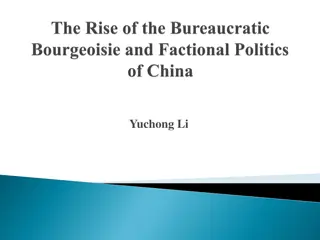Media monopoly
Explore the implications of corporate media control on politics, culture, and democracy. Analyze the challenges faced in contemporary debates about media control. Assess the role of new communication technologies in reshaping media power dynamics. Understand the transformation of the U.S. media syst
2 views • 47 slides
Rethinking Work: Insights from Barry Schwartz's Speech
Barry Schwartz challenges the broken mindset towards work in his thought-provoking speech. He delves into why we work, the impact of capitalism on work satisfaction, and the dangers of false ideas. By exploring key theories about human nature and sources of poverty, Schwartz prompts reflection on th
1 views • 18 slides
Understanding Globalization in Today's World
Globalization in today's society is a complex process involving interconnection and interdependence among individuals, places, and organizations worldwide. This phenomenon is driven by factors such as market expansion, technological innovations, and financial interdependence, leading to a compressio
3 views • 30 slides
Challenges and Legal Framework for AI Regulation in the EU
Addressing the complexities of regulating artificial intelligence and data law in the European Union, the ELTE Chung Ang Artificial Intelligence Conference delves into the challenges requiring legal answers, the balance between regulation and law enforcement, and the evolving nature of legal norms i
2 views • 21 slides
Approaches to the study of Human Rights
The Marxist perspective on human rights emphasizes social rights over individual rights, viewing the full realization of self within society. Marx connects bourgeois society with human rights, highlighting how exploitation under capitalism alienates individuals. In contrast, the Third World perspect
5 views • 19 slides
A.R. Desai: Contributions to Indian Nationalism and Sociology
A.R. Desai, a prominent figure in the field of sociology, made significant contributions to Indian nationalism and the study of society in India. His works focused on topics such as the social background of Indian nationalism, peasant movements, path of development, and Marxist democratic rights. De
5 views • 14 slides
Comparative Corporate Governance and Financial Goals in Multinational Business
Understanding the dynamics of Comparative Corporate Governance and Financial Goals in Multinational Enterprises (MNEs), exploring the significance of Shareholder Wealth Maximization, Stakeholder Capitalism, and the impact of cultural, governance, and financial differences on global financial managem
0 views • 20 slides
Evaluation of Economic Crisis Causes in 1929-1933: Republican Policies and Factors
The economic crisis of 1929-1933 in the USA was influenced by various factors, including Republican government policies favoring laissez-faire capitalism, overproduction of goods, weaknesses in the banking system, international economic issues, and the Wall Street Crash. The prosperity of the 1920s,
0 views • 33 slides
Evolution of Modern Literature in the 20th Century
The Modern Age in literature emerged in response to the Victorian era, marked by a shift in attitudes towards life and society. Influenced by historical, economic, and ideological factors such as World Wars, capitalism, and the disintegration of empires, Modern Literature explored new themes and sty
1 views • 14 slides
Evolution of Modern State: Three Macro-Patterns Explored
The evolution of the modern state is influenced by three key macro-patterns: War and Militarism, Emergence of Capitalism, and Struggle for Citizenship. These patterns involve deep processes of change over long periods, contributing to the development of modern liberal democratic states. War and Mili
0 views • 13 slides
Debate Framework for Capitalism vs. Communism
This debate framework presents a structured approach for arguing in favor of or against the motion that capitalism is superior to communism. It includes sections such as introduction, statement of the motion, definitions, and criteria or principles to guide the debate. Emphasis is placed on developi
0 views • 9 slides
Insights Into 'An Inspector Calls' Characters
In "An Inspector Calls," the Inspector represents socialism, with an air of solidity and omniscience. He delivers a warning about mankind needing to change and accept responsibility. Mr. Birling, on the other hand, embodies capitalism, shown as unlikeable and out of touch. The play critiques Birling
0 views • 7 slides
Insights into "An Inspector Calls": Themes and Contexts
A detailed exploration of key quotes and themes from "An Inspector Calls" by J.B. Priestley, such as responsibility, class divides, and societal change. The analysis delves into characters' perspectives, societal norms of the Edwardian era, and the impact of significant events like World War I. The
0 views • 5 slides
Critiques of Modernity and Liberal Ideology: Marcuse and Habermas
Herbert Marcuse's concept of One-Dimensional Man critiques capitalism's impact on human freedom and alienation in Western society. Marcuse emphasizes awakening individuals to their alienation to ignite their urge for freedom. Jurgen Habermas, in contrast, focuses on rational critique rooted in human
1 views • 5 slides
Understanding Marxism and Capitalism
Marxism is a body of social, political, and economic thought derived from the works of Karl Marx and Friedrich Engels, focusing on the analysis of capitalism. Capitalism is an economic system where private individuals own goods and services based on market supply and demand. The purest form of capit
0 views • 25 slides
Understanding Insiders and Outsiders in Arab Political Economies
Examining core Arab countries outside the Gulf, this analysis delves into the unique features of Arab capitalism, highlighting low state capacity, heavy regulation, and segmented labor markets. State intervention plays a crucial role in creating insiders and outsiders, shaping a landscape of low ski
1 views • 56 slides
The Globalization Debate: Understanding Contemporary Perspectives
The debate on globalization revolves around defining it, its impact on state power, and the role of politics. Three main schools of thought - Hyperglobalizers, Sceptics, and Transformationalists - offer contrasting views on whether globalization is primarily an economic phenomenon reshaping traditio
0 views • 12 slides
Understanding Liberalism: Key Ideas and Historical Context
Liberalism, a prominent political ideology, emerged in the 19th century and is closely linked to capitalism. It stands against absolutism and feudal privileges, advocating for individualism, freedom, reason, equality, toleration, consent, and constitutionalism. The evolution of liberalism emphasized
1 views • 18 slides
Understanding Socialism: A Comprehensive Overview
Socialism is a political and economic ideology that advocates for collective or state ownership of production, distribution, and exchange. It emerged in the early 19th century as a response to industrial capitalism, aiming for a more egalitarian society that prioritizes collective well-being. Social
0 views • 9 slides
Understanding Capitalism, Modernism, and Postmodernism in Literature
Terry Eagleton's essay delves into the impact of capitalism on art and literature, exploring the emergence of modern and postmodern literature in the capitalist and late capitalist eras. He discusses how late capitalism influences art with characteristics like mass consumerism and virtual reality. P
1 views • 7 slides
Evolution of Companies and Global Business Impact
The presentation delves into the historical evolution of companies, from ancient multi-nationals to modern global corporations. It explores the intertwined relationships between economic expansion, colonialism, capitalism, and socialist movements. The presentation also discusses the role of companie
0 views • 20 slides
Understanding Socialist Democracy: A Political Ideology Explained
Socialist democracy is a political idea that combines elements of democracy and socialism, rejecting capitalism and authoritarian socialism. Proponents advocate for democratic decision-making and public ownership of the means of production. They believe in economic equality, government regulation of
2 views • 13 slides
Social Democratic Politics: Pillars and Strategies for Transformation
Social democratic politics is rooted in democratic collectivities and rights, aiming to reshape capitalism through reform, regulation, and transformative strategies. Olle Törnquist delves into the historical foundations and the need for comprehensive reforms to challenge the dominant logics of capi
3 views • 10 slides
The Role of Corporate Law in Wealth Distribution and Capitalism
Exploring the evolution of corporations within capitalist frameworks, this analysis delves into the intertwined concepts of managerialism, infinite wealth accumulation, and the social-historical embeddedness of corporations. Through historical contexts and theoretical perspectives, the discussion de
0 views • 17 slides
Evolving Trends in Business Education for Responsible Capitalism
Explore the developments and challenges in business education for responsible capitalism, focusing on the role of business schools, a decade of progress in programs and research, and analysis of UN PRME signatory reports. Discover how sustainability-related research and learning offerings are shapin
0 views • 25 slides
Exploring the Moral Foundations of Capitalism
Delve into the historical origins and ethical principles underpinning capitalism as seen through iconic quotes, foundational texts, and philosophical analysis. Understand the intertwined concepts of liberty, economics, philosophy, and ethics that shape capitalist ideology and practices, emphasizing
0 views • 42 slides
Shadow Education and Educational Capitalism in Cambodia
Exploring the impact of shadow education on the nation-state in Cambodia, this analysis delves into the complex interplay between educational development, compulsory schooling, privatization practices, and the emergence of educational capitalism. It questions the traditional notions of nation-state
0 views • 8 slides
Queer Art Beyond Identity Politics: Exploring Capitalism, Gentrification, and LGBT+ Inequalities
Explore the complex intersections of capitalism, gentrification, and LGBT+ identities through the lens of queer art and community activism. Unpack the nuances of human capital theory, dominance of middle-class white gay men, and challenges faced by people of color within the LGBT+ community. Contemp
0 views • 13 slides
Thorstein Veblen: Critic of Capitalism and Founder of American Institutionalism
Thorstein Veblen, a key figure in the history of economic thought, criticized capitalism for its rough and monopolistic nature. He founded the American Institutionalism School and challenged neoclassical economics' view of rational consumer behavior and business motivations. Veblen's analysis focuse
0 views • 23 slides
Transition to Post-Capitalism: Unconditional Citizen Income in Mexico
Unstoppable technology advancements in capitalism lead to the replacement of human labor, creating an insufficient wage-labor income link. The concept of an Objective Limit of Capitalism (OLC) suggests that the need to exploit human labor will diminish as science progresses, highlighting the necessi
0 views • 7 slides
Critique of Capitalism: Reasons and Varieties by Asger Sørensen, Ph.D.
Asger Sørensen, Ph.D., delves into the critique of capitalism, exploring various perspectives such as political contestation, economic analysis, and value assessment. Through historical contexts and theoretical frameworks, Sørensen raises fundamental questions about capitalism's impact on freedom,
0 views • 10 slides
Unveiling the Dirty Secrets of Capitalism by Nick Hanauer
Nick Hanauer, a successful capitalist, sheds light on the flaws of capitalism and neoliberal economic theory, emphasizing the need for regulatory changes to benefit the majority. He challenges the assumptions of market capitalism and advocates for a new economic approach focused on cooperation and s
1 views • 25 slides
Exploring Surveillance Capitalism and Academic Skills
Delve into the world of surveillance capitalism, academic skills, and the importance of maintaining an academic tone in speaking and writing. Explore self-assessment tools, including assessments on online privacy and security. Learn from experts like Mark Weinstein about social media, privacy advoca
0 views • 20 slides
A Brief History of Communism: From Capitalism to Karl Marx's Vision
The history of communism traces back to the capitalist system's exploitation of workers in the mid-1800s. Karl Marx's vision, outlined in "The Manifesto of the Communist Party," aimed for economic equality and worldwide revolution. The inherent flaws of capitalism were critiqued, leading to the rise
0 views • 17 slides
The Political Economy of Regime Change in Central-Eastern Europe
The content discusses the concepts of socialism and capitalism, exploring various models and transitions from socialism to capitalism. It focuses on regime changes in Central and Eastern Europe, with case studies on Poland and Hungary. The text covers different varieties of socialism and their econo
0 views • 21 slides
Evolution of Capitalism and Welfare Development
Earnest Mandel identified three types of capitalism - industrial, entrepreneurial, and corporate - each influencing welfare development differently. Industrial capitalism lacked state welfare, while entrepreneurial capitalism introduced social security measures. Corporate capitalism necessitated sta
0 views • 10 slides
The Division of Labor and Social Order in Capitalism
In capitalism, conflict is viewed as an essential component of social relations, leading to increased productivity and unity among individuals. The division of labor promotes specialization and efficiency in production, ultimately benefiting society as a whole. Comparative advantages and opportunity
0 views • 16 slides
The Interplay of Economics and Politics: A Comprehensive Analysis
Explore the intricate relationship between economics and politics, delving into the evolution of capitalism, the necessity of private property rights, challenges in establishing capitalism in certain countries, and the complex dynamics between capitalism and democracy. The discussion highlights the
0 views • 9 slides
Exploring the Complex Relationship Between Football and Capitalism
The relationship between football and capitalism is analyzed through contrasting viewpoints, with one side viewing football as a tool for distracting the populace and compensating for societal injustices, while the other sees it as a form of art and human expression. The discussion delves into the s
0 views • 26 slides
Understanding China's Bureaucratic Capitalism and State-Directed Economy
China's approach to capitalism under Deng's reform embodies state-directed capitalism, characterized by central control over economic reforms while maintaining a non-democratic political system. This model has led to the rise of a bureaucratic capitalist regime with state-backed companies dominating
0 views • 11 slides
